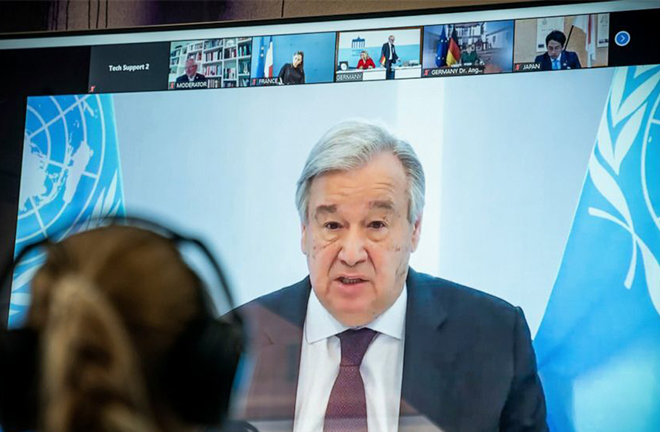COVID-19 pandemic threatens global sustainable development

António Guterres, United Nations Secretary-General, displayed on a screen at the Petersberg Climate Dialogue and called on for visionary and collaborative leadership to rebuild the world for the better. Photo: AGENCIES
The United Nations High-Level Political Forum on Sustainable Development in 2020 was held from July 7–16 in New York. The participants discussed the progress that has been made towards achieving the Sustainable Development Goals (SDGs) by the year 2030, the lessons we have learned and the challenges currently facing us. António Guterres, UN secretary-general, warned that COVID-19 is reversing decades of global progress on ending poverty and hunger and taking the world further away from the SDGs.
Many national budgets were flush with funds when the UN adopted the SDGs, and governments signed ambitious treaties, including the Paris Agreement, the Sendai Framework for Disaster Risk Reduction 2015–2030 and the Addis Ababa Action Agenda, said Robin Naidoo, an adjunct professor from the Institute for Resources, Environment and Sustainability at the University of British Columbia. Five years on, that mood of optimism has gone. The COVID-19 pandemic is exposing the fragility of the SDGs and also of sustained economic growth and globalization, the two foundations for the success of the SDGs.
According to the World Economic Outlook updated by the IMF in June, COVID-19 has had a more negative impact on economic activity in the first half of 2020 than anticipated. Global growth is projected to decrease by 4.9%. The timeframe for recovery will be years, not months, if the past is any guide. The world will also face further environmental stressors in the next decade, such as degradation of ecosystems and loss of biodiversity. Extreme weather events are likely to become more frequent due to climate change and geopolitical unrest might follow. More funding will be needed to address these problems, which may impede the realization of other SDGs.
Brendan Fisher, an associate professor from the Rubenstein School of Environment and Natural Resources at the University of Vermont, analyzed the impacts of COVID-19 on the SDGs and found the goal of good health is the most obvious casualty. The pandemic has put health systems under great pressure.
The Organisation for Economic Cooperation and Development (OECD) estimate on the COVID-19 impact points to a 60–80% decline in international tourism in 2020, reducing tourism’s contribution to the world economy and affecting countries where tourism is a substantial part of the national economy. This could in turn weaken the funding of the SDGs for environmental protection.
The lack of funding will be the biggest hurdle for the realization of the SDGs after COVID-19 dies down, said Fisher. Governments, communities and individuals will be shifting priorities to deal with issues closer to home. That, combined with the global economic slowdown, means there is likely to be less time committed to tackling global challenges. Under such circumstances, focusing on fewer and more fundamental goals is crucial.
COVID-19 is a stress test of the globalized economy and of sustainable development. Just as when we faced the 2008 financial crisis, lessons must be learned and the financing, oversight and implementation of the SDGs must be reformed. Sustained per-capita economic growth in accordance with national circumstances is itself an SDG target, but using GDP as the measure of economic growth assigns value to undesirable factors, such as traffic jams and environmental pollution, noted Naidoo. Traditional models of economic growth cannot continue forever on a planet where resources are finite and already over-exploited. Future economies should focus on development (improving well-being) rather than on growth (increasing economic throughput). Other key elements of globalization, such as interconnectedness, must be questioned too. International trade, cross-border tourism and telecommunications have created opportunities for billions of people but also increase the risk of spreading epidemics, financial contagion and environmental degradation. The overall costs and benefits of economic globalization now need to be re-examined.
If the world’s economic pie cannot increase, it must be sliced in different ways, suggested Naidoo. For instance, governments should reduce subsidies that are anathema to the SDGs. According to a report published by the IMF in 2019, global fossil fuel subsidies amounted to 4.7 trillion dollars (6.3% of global GDP) in 2015 and 5.2 trillion dollars (6.5% of global GDP) in 2017. Continued reliance on fossil fuel will impede success in a number of SDGs, especially those on clean energy, sustainable cities and communities, biodiversity and climate change. Another way to re-divide the pie is to rein in corporate profits and combat tax avoidance. IMF analysis shows that non-OECD countries lose about $200 billion in revenue per year due to companies shifting profits to low-tax locations.
Fisher noted that the mind-boggling sums invested in military defense are at odds with international cooperation for sustainable development. Countries should cut down on military expenditures and divert the funding to climate action, prevention and treatment of epidemics, and other enterprises that help achieve the SDGs.
edited by WENG RONG

 PRINT
PRINT CLOSE
CLOSE